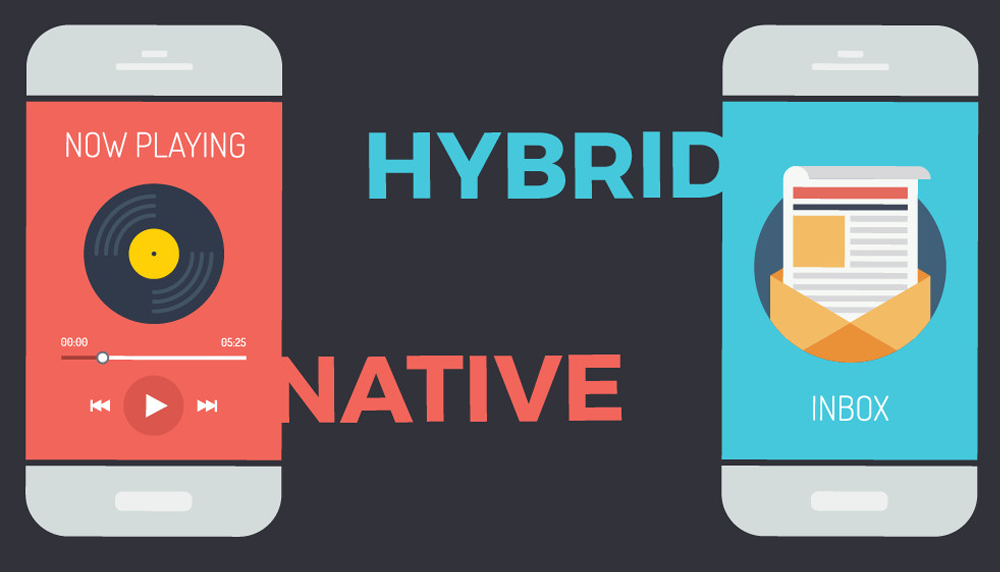Are you planning to have an app created for you and your business? Do you know the difference between a Native app and Hybrid apps? This blog focuses on such areas and promises to even give you more useful details.
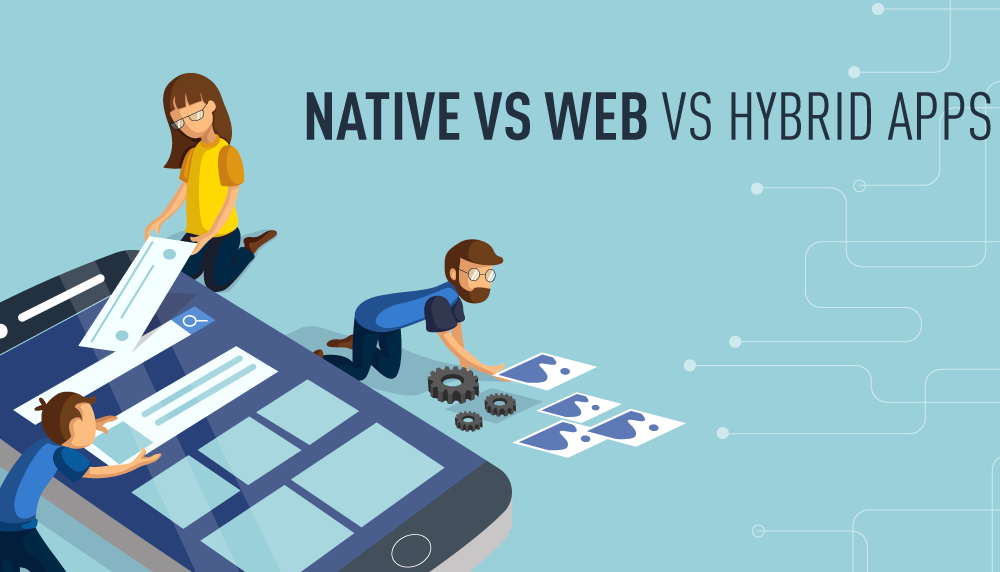
Introduction
The smartphone market has significantly grown over the past few years, with the volume of global shipments estimated to reach up to 1.654 billion in 2022 while the number of smartphone users exceeds 3 billion by the same year.
This has led to the proliferation of mobile apps and hot debates on the Native app vs Hybrid app.
Any brand that wants to remain in business for the long haul has since discovered that having a strong mobile presence is not optional. As such, the mobile app development universe is vital for business growth in the modern world.
However, the critical decision to develop mobile applications also comes with several vital choices that need to be made to capture the full attention of smartphone users successfully. Among these choices, one stands out heads and shoulders above all; the choice between native app vs hybrid app development.
But what is the difference between Native app and Hybrid app? These two approaches to mobile application development come with their advantages and disadvantages, respectively. This is what this post will look into, so make sure you read it to the end.
NativeAapp vs Hybrid App development: Why The Fuss?
According to a relatively recent survey, more than 50% of web traffic originates from smartphone users. Developing mobile apps to court the attention of smartphone users is now key to any business’s growth in today’s modern world.
This is why many organizations or brands are presently incorporating mobile apps into their respective workflow. Tapping into the mobile revolution is vital for boosting their market outreach.
One of the common challenges such brands face as they get set to enter the mobile-first universe is deciding on the particular type of mobile app to develop or build.
Building a Native app vs Hybrid app depends on the priorities of the organization. Some of the significant factors that must be considered include:
- What the mobile application is trying to achieve
- The distinct features to be included in the mobile app
- The user experience that the app offers
- The time required to develop the application
- The performance and speed of the mobile app
- Whether to opt for in-house app development or hire a freelancer or agency for the job
- The budget allocated for the development of the mobile application
All these will determine whether to opt for native app development over hybrid app development or vice versa. The difference between Native app and Hybrid app is about to be unveiled as this will determine the best approach you should follow for your mobile app development.
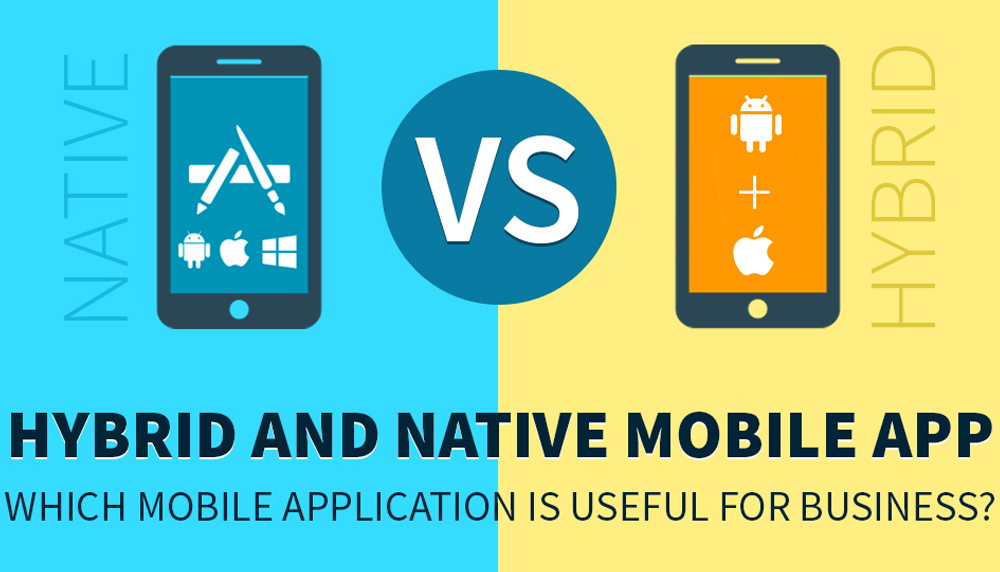
What is the difference between a Native app and a Hybrid app?
Native apps are generally developed using a platform-specific programming language. That is to say that they are created for a particular mobile operating system. This is done so that it follows the user experience and technical guidelines of the operating system. This makes native apps more secure and faster.
This makes the application highly compatible with the corresponding platform only. Native applications can also have highly complex integrations with device-specific software and hardware. It has a very high level of precision and is swift to execute. The apps also enable access to the designs and native user interface panels.
Android applications are usually developed in Java, but iOS apps are created using Apple’s Swift.
The following are the characteristics of native apps:
- Native applications are highly reliable.
- The features of native applications can be employed in the best way.
- Native applications have faster performance, are simple to develop, and also offer much better user experiences.
- Native applications heavily support both offline and online operations.
Hybrid applications, however, are usually developed using innovative web technologies such as JavaScript, HTML5, and CSS. This is done in combination with native elements.
Hybrid apps are independent of any platform but are displayed using a native web view. This refers to the native component made available by operating systems like iOS and Android in order to load web content seamlessly.
Here are the characteristics of hybrid apps:
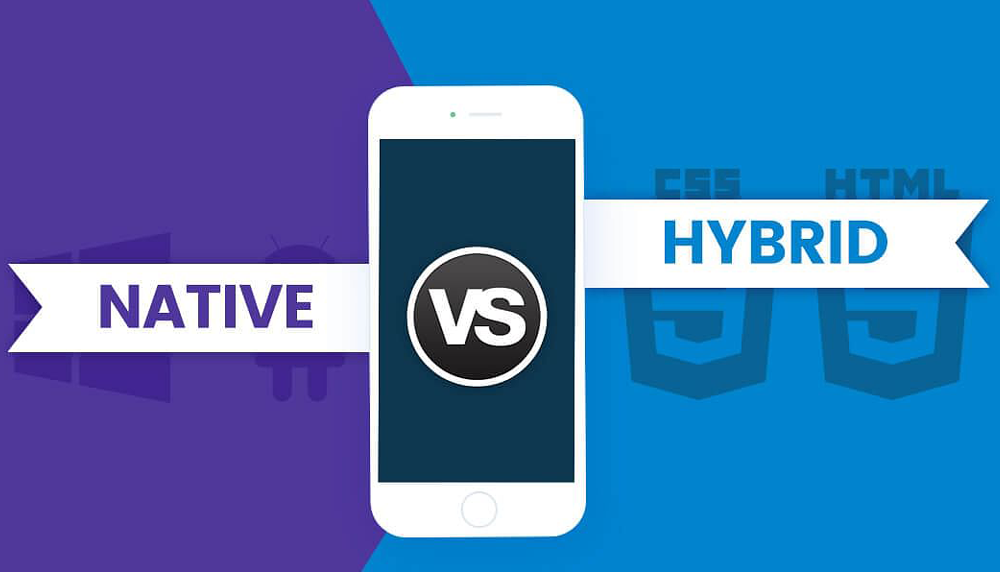
- Hybrid apps can function remarkably well, whether the device has an internet connection or not.
- Hybrid applications involve smooth integration with web-based services
- Hybrid apps can easily integrate with the device’s file system as well as the features of the operating system.
- Hybrid applications usually come with an embedded browser that helps to significantly boost access to dynamic online content.
- Hybrid applications generally have a cross-platform UI (user interface).
- Hybrid apps can be developed within a short time as it involve lesser development as well as maintenance costs. This ends up saving lots of time and money, especially if you are a startup.
- One significant benefit of a hybrid application is the single codebase for multiple platforms. This makes it incredibly easier to manage these mobile apps.
Native App vs Hybrid App Technologies in App Development
The following are the technologies for native Android app development:
- Kotlin: Kotlin is a programming language developed to work specifically with Java Virtual Machine and Java. Tech giant Google approves the usage of this programming language for the development of native mobile apps.
- Kotlin holds one significant advantage over mainstream Java: its type interface allows you to work with shorter syntax. This significantly minimizes the time it usually takes to build an app.
- Java: Java is the programming language that is generally used for mobile application development. Most web and desktop development is based on Java. Developers have access to a unique system of tools and a robust library. However, the performance of apps built on Java is very slow compared to other frameworks.
Popular native Android apps include:
- LastPass Password Manager
- Google Now Launcher
- Swiftkey Keyboard
- Pocket Casts Podcasts, etc.
Technologies for native iOS app development:
- Swift: This is a relatively new programming framework made popular by the tech giant, Apple. It has grown to become popular and the preferred option for building or developing high-quality native iOS applications. Swift is loved for its easier learning curve as well as quicker performance. And since it is always under development, it lacks some components that you’d love to see and use. However many developers believe it will replace Objective-C in the future.
- Objective-C: This is the programming language that is known for its available libraries and impressive development experience. A plethora of mobile app developers also backs the programming language. Objective-C is considered a mature framework as it offers excellent compatibility with other programming languages.
Examples of popular native iOS apps include:
- WordPress CMS
- Artsy Auctions App for Arts
- The Firefox Browser
- 2048 Game, etc.
Technologies used for hybrid app development
- Xamarin: This is an open framework supported and maintained by the tech giant, Microsoft. This framework facilitates the accessibility of codes across numerous platforms. It has helped to improve both development speed as well as simplify maintenance significantly. It is suitable for simple apps and is typically chosen only for business-related projects.
- Flutter: Google created this popular, open-source UI software development kit. It enables app development for iOS, Android, Mac, Linux, and even Windows as well as the web, all from a single codebase.
It has the majority of the native components of the entire framework itself, meaning that there won’t always be a need for a bridge to communicate with native components.
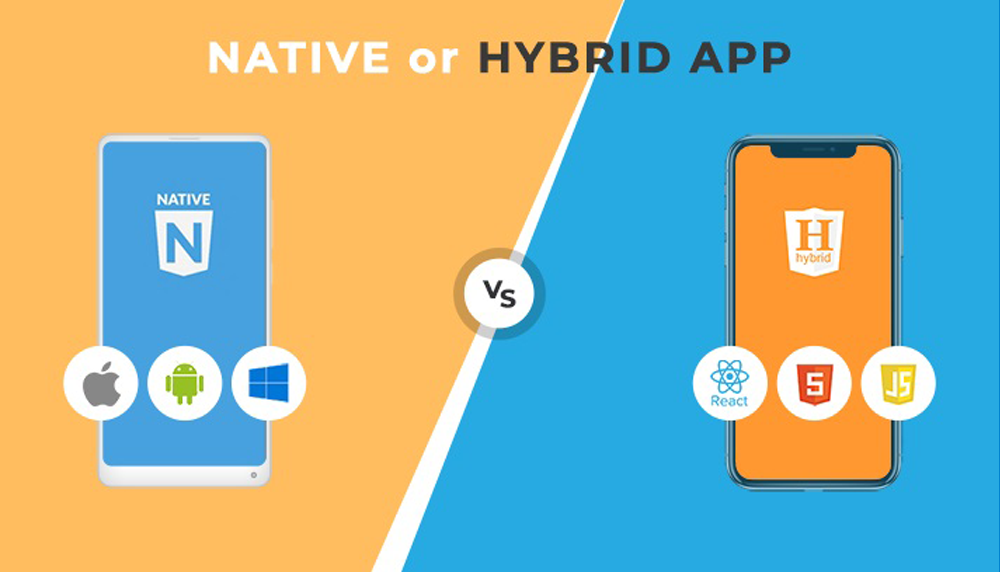
Flutter writes graphics directly to the hardware via the Skia engine. Any changes are seen almost instantly.
- Ionic: This is a framework – e.g., CSS, HTML, JavaScript, Angular, etc. – that is known for producing mobile apps with standard web technologies. Developers that use Ionic also have access to lots of simple UI components. Development time is favourable, though maintenance is a tad difficult.
Ionic offers several plugins, so fixing bugs may require intense manual work.
- React Native: This is an open-source technology created by Facebook for one sole purpose: cross-platform compatibility.
It has a highly simplified UI, which significantly increases performance such as reloading times, etc. React Native is mostly used by developers due to its short development time. However, it lacks a few components, even though the community and Facebook regularly update it.
Examples of cross-platform apps include:
- Discord Voice Chat
- UberEats
- AirBnB Rental Service, etc.
Native App vs Hybrid App: The Pros and Cons
As mentioned briefly at the beginning of this post, mobile app development approaches – i.e., Native app vs Hybrid app – have their respective benefits and disadvantages. Companies must consider all these pros and cons when deciding how to break into the mobile application market.
The pros and cons will also highlight the difference between Native app and Hybrid app.
Cost of Developing Mobile Apps
The most crucial factor that influences precisely how organizations develop their applications is the cost of development. Hybrid applications take the upper hand in this instance.
This is because hybrid apps can be developed for any platform right from a single codebase. This means that they are much cheaper to build or develop than native applications.
For instance, it costs about $35,000 for a small company to develop a minimum viable product (MVP) using the hybrid approach. But when it comes to building a native app for iOS and another native application for Android, the company may end up spending as much as $50,000. That is a lot of money that could be better spent on other vital things, especially if you are a startup.
Performance of the mobile app
As mentioned elsewhere in this post, native applications are built with platform-specific programming languages. This allows savvy developers to optimize these native applications for maximum performance fully.
On the other hand, hybrid apps fundamentally add another layer between the source code and the target platform. But this could result in some performance loss.
In 2012, Facebook moved away from hybrid applications. According to the co-founder of the biggest social media platform today, Mark Zuckerberg, the biggest mistake the company made was betting heavily on HTML5 over native.
But of course, only a handful of companies will ever build mobile apps that will attain the same magnitude as Facebook. Several types of mobile applications do not need as much optimization to run seamlessly and exceptionally on almost all mobile devices.
Such applications can easily benefit from the hybrid approach the most. Nevertheless, native applications will always win when it comes to performance. This is the primary reason why hybrid app games are very scarce.
Time of developing mobile apps
Building hybrid applications takes far less time than it takes to build native applications. Why is this so, you ask? This is because hybrid apps are developed with web technologies like JavaScript, HTML5, and CSS. These make it possible for anyone to go from a rough idea to a working minimum viable product (MVP) or prototype. This happens much faster than those programming-specific languages you know.
Moreover, hybrid applications can share a single codebase to run multiple platforms. This also shortens app development as well as the time to market. Organizations that build a native application usually end up launching much sooner on only one platform.
And such a development could harm the organization as smartphone users of other platforms become alienated and angry.
Maintenance of mobile apps
These days, smartphone users have incredibly high expectations of mobile applications. According to a Compuware survey, up to 42% of mobile application users expect these apps to load quicker or faster – within 2 seconds, on average – than mobile sites. This, however, can only be achieved with regular bug fixes and updates.
To develop native apps, multiple codebases need to be maintained, i.e., one for iOS and one for Android or Windows. Since iOS developers are not usually fluent in Android development – and vice versa – organizations that opt for native app development may end up keeping at least twice as many developers on their payroll compared to firms that opt for hybrid app development.
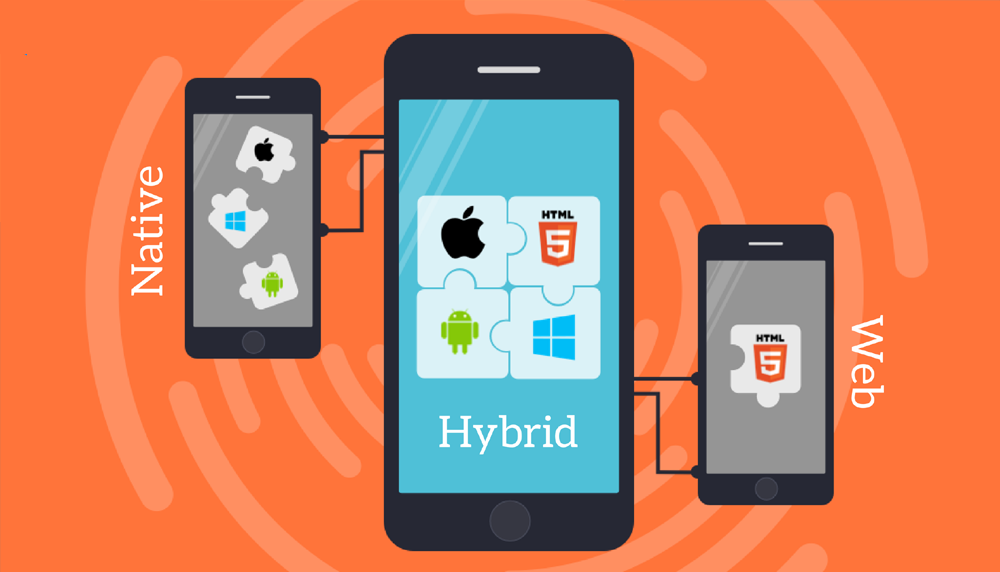
User experience
Most smartphone users do not care about the technology that powers their favourite mobile applications. What they are concerned about is user experience.
According to a study, up to 79% of smartphone users are willing to retry a mobile application once or twice if it fails to load or work for the very first time. But then, having a working mobile application these days is no longer enough.
The mobile app must also look and behave in ways that are consistent with the platform. It must also support platform-specific features and common gestures.
Although hybrid apps can feel and look much like native applications, the user experience they offer smartphone users is not as polished and seamless as native apps.
That said, frameworks for mobile hybrid applications – such as Xamarin, React Native, PhoneGap, NativeScript, or Ionic – are continually getting better. This constant improvement is surely going to simplify the development of native-like user experiences.
Conclusion
As you can see, the difference between Native app and Hybrid app is vast. Native apps are highly suitable for products that require custom features and flawless performance. But hybrid apps are perfect for developing MVP (minimum viable products) with limited timeframes and budgets.
Deciding on the type of mobile app to opt for depends significantly on your organization’s demands, specifications, or business. This is why it is highly recommended that you discuss these issues with mobile app developers since they are in the best position to shape your ideas in the best possible way.
The vital information shared in this post should be more than enough to help you or your brand decide on which to opt for: native app vs hybrid app.
Mobile app development is also better outsourced as against having a permanent in-house team or setup. This is because collaborating with an outsourced app development team would make your efforts at developing a mobile app an effortless job. Now that you know the difference between Native app and Hybrid app you can go ahead and have your app created today!
